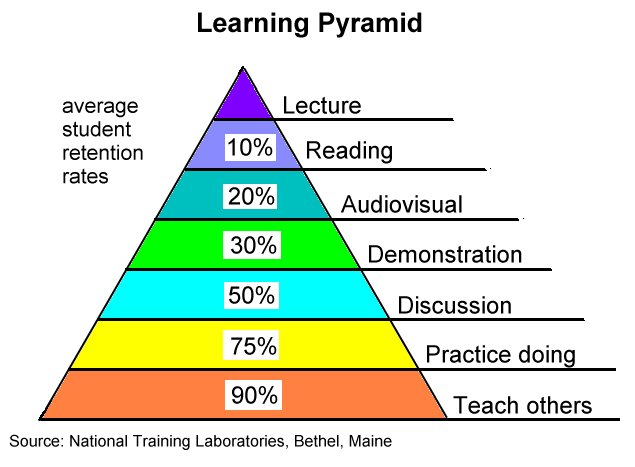You won't be surprised to learn that there are different versions out there with different percentages and some minor variations in the ordering of ac
Certainly, some mental activities are better for learning than others. And the ordering offered here doesn't seem crazy. Most people who have taught agree that long-term contemplation of how to help others understand complicated ideas is a marvelous way to improve one's own understanding of those ideas--certainly better than just reading them--although the estimate of 10% retention of what one reads seems kind of low, doesn't it?
If you enter "cone of experience" in Google scholar the first page offers a few papers that critique the idea, e.g., this one and this one, but you'll also see papers that cite it as if it's reliable.
It's not.
So many variables affect memory retrieval, that you can't assign specific percentages of recall without specifying many more of them:
- what material is recalled (gazing out the window of a car is an audiovisual experience just like watching an action movie, but your memory for these two audiovisual experiences will not be equivalent)
- the age of the subjects
- the delay between study and test (obviously, the percent recalled usually drops with delay)
- what were subjects instructed to do as they read, demonstrated, taught, etc. (you can boost memory considerably for a reading task by asking subjects to summarize as they read)
- how was memory tested (percent recalled is almost always much higher for recognition tests than recall).
- what subjects know about the to-be-remembered material (if you already know something about the subject, memory will be much better.

The cone of learning may not be reliable, but that doesn't mean that memory researchers have nothing to offer educators. For example, monograph published in January offers an extensive review of the experimental research on different study techniques. If you prefer something briefer, I'm ready to stand by the one-sentence summary I suggested in Why Don't Students Like School?: It's usually a good bet to try to think about material at study in the same way that you anticipate that you will need to think about it later.
And while I'm flacking my books I'll mention that When Can you Trust the Experts was written to help you evaluate the research basis of educational claims, cone-shaped or otherwise.

 RSS Feed
RSS Feed